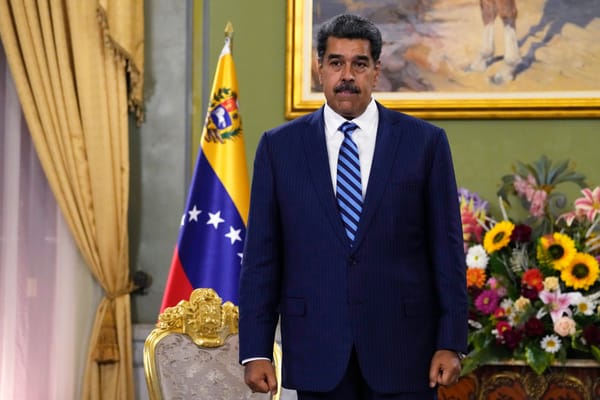Last week in Barbados, US officials announced a partial lifting of sanctions against the authoritarian socialist regime of President Nicolás Maduro. The move was part of a broader agreement between the Biden administration, the Venezuelan government, and the Venezuelan opposition. The diplomatic breakthrough has both reinvigorated the country’s moribund opposition and provided a financial lifeline to Maduro. While much remains to be seen, it is a welcome departure from Washington’s failed Venezuela policy.
In recent years, the Venezuelan opposition has consistently boycotted local and national elections, alleging unfair electoral conditions. Consequently, in 2018, Maduro won a landslide re-election that the opposition refused to recognize. Juan Guaidó, president of the National Assembly, proclaimed himself interim president of Venezuela in 2019 with the backing of 52 countries, including the United States. In the ensuing power struggle marked by mass mobilizations and a failed military uprising, Guaidó went on to join Venezuela’s long list of failed opposition leaders.
Since then, the Venezuelan opposition has gradually come to the realization that competing in future elections—even in the absence of a level playing field—is its only chance to maintain relevance. The Barbados agreement offers some hope for fairer elections in 2024: The Venezuelan government has agreed to release political prisoners, lift bans on opposition candidates, and allow for the presence of foreign and independent observers.
Washington also got something from the deal. Caracas has agreed to cooperate on the deportation of Venezuelans who have entered the United States illegally. Since breaking off relations in 2019, America has been unable to deport one of the largest groups of illegal immigrants arriving in the country in recent years. By easing sanctions on Venezuelan oil, the Biden administration has also helped to lower oil prices set to rise due to turmoil in the Middle East. Analysts now expect Venezuela to be able to boost oil production to more than 1 million barrels a day, a 25 percent increase, with an additional increase of 300,000 barrels a day by 2025.
Predictably, the deal has elicited an outcry from Venezuela hawks, with Miami neoconservatives like Rep. Mario Díaz-Balart accusing Team Biden of appeasement. Meanwhile, Sens. Kevin Cramer and Joe Manchin have criticized the administration for looking to boost oil production from unreliable enemies, rather than drill at home. It is true that the White House, under the sway of climate activists, is limiting the growth of domestic energy production, but that doesn’t mean America should further sabotage itself by adhering to the bankrupt ideology of Miami hawks.
Both US political parties back realism and restraint in foreign policy opportunistically. Just as Democrats accuse the GOP’s populist wing of appeasing Vladimir Putin for calling for a negotiated peace in Ukraine, so Republicans now accuse Democrats of appeasing Maduro. Hard as it may be for interventionists on the left and right to understand, foreign policies grounded in quantifiable goals, concrete timelines, and viable offramps are preferable to policy predicated on vague ideals, ladders of escalation, and “as long as it takes” jingoisms. The Barbados agreement is an example of realism in US foreign policy. Both Secretary of State Anthony Blinken and the National Security Council adviser for the Western Hemisphere, Juan González, offered clear warnings to Maduro in the wake of the agreement that current and future sanctions relief is contingent upon Caracas fulfilling its commitments to the opposition—namely, the rehabilitation of banned candidates.
Back in June, Venezuela’s electoral authorities banned Maria Corina Machado, the opposition’s leading candidate for the presidency, from holding public office. Indeed, the timing of the Barbados agreement was planned strategically to precede Sunday’s opposition presidential primaries, in which Machado secured a resounding nomination despite the ban. Electoral authorities now have until the end of November to lift the ban on all opposition candidates, including Machado, as well as release additional political prisoners and “wrongfully detained” US citizens.
Whether Maduro meets these conditions remains to be seen. If he does follow through, it will be for the simple reason that he thinks he can win a relatively fair race. This possibility may seem shocking, given the abuses of his regime, but at this point, the mass anti-government mobilizations of 2013, 2014, 2017, and 2019 are the stuff of a more hopeful past. The Venezuelan population is largely disaffected and demoralized—though Sunday’s primaries yielded a far higher turnout than was expected. Close to 8 million Venezuelans—around a fifth of the population—are now thought to have immigrated to other countries. Many of these were once active in opposition protests.
“The opposition has lost much of its credibility since 2019.”
Further, the opposition has lost much of its credibility since 2019. Many Venezuelans resent opposition leaders for basking in the sanctimony of US-funded victimhood while living lives of luxury in Miami as the country continues to fall apart. One poll from August 2022 found that 70 percent of Venezuelans don’t trust any opposition leader, including Guiadó and Machado. Guaido in particular has seen his image tarnished by scandals involving the mishandling of funds he received from the United States during his “interim presidency.”
The best-case scenario for 2024 is that—like the 1988 referendum that ended Pinochet’s dictatorship in Chile—overconfidence on the part of the regime and overwhelming turnout may be enough to force some sort of transition. An electoral blow to Maduro could help reinvigorate the opposition and lead to additional electoral guarantees in the future. Odious as the Maduro regime is, the mere existence of a mechanism capable of encouraging better electoral conditions is better than the alternative. The fact of the matter is that the Barbados agreement is the best that both the opposition and US officials could realistically hope for.
